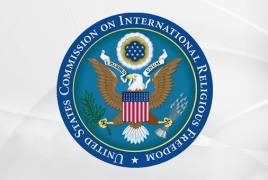USCIRF: Azerbaijan erases Armenian heritage June 10, 2025 - 11:33 AMT PanARMENIAN.Net - On June 5, the U.S. Commission on International Religious Freedom (USCIRF) held virtual hearings focused on the state of religious freedom in Azerbaijan, highlighting political imprisonment and the suppression of free speech, as reported by the Armenian Assembly of America. The session emphasized alarming violations of religious freedom and the ongoing destruction of cultural heritage, particularly religious sites in Nagorno-Karabakh. USCIRF noted that the Azerbaijani government is actively “erasing Armenian cultural heritage.” In February 2025, USCIRF visited Azerbaijan to assess religious freedom and met with religious communities, human rights defenders, and government officials. Its 2025 annual report advised the U.S. State Department to place Azerbaijan on its Special Watch List for “severe violations of religious freedom.” In his opening remarks, USCIRF Chair Stephen Schneck described Azerbaijan’s religion law as “one of the most repressive globally,” criticizing recent legal changes that further entrench regime control and isolate the country from international norms. Schneck expressed concern over “ongoing destruction and repurposing of ancient Armenian churches and other religious and cultural sites in Nagorno-Karabakh” by the Aliyev regime. He urged the U.S. State Department to keep Azerbaijan on the Special Watch List and continue monitoring religious rights. Commissioner Vicky Hartzler condemned the “repression and brutality” against religious groups in Azerbaijan and called for political and economic sanctions against individuals and entities complicit in religious rights violations. Hartzler also stressed the need to protect Armenian religious and cultural heritage from further destruction, recommending the deployment of international observer missions to Nagorno-Karabakh for assessment and documentation. She appealed to Congress for sustained engagement on this issue. Panelists—including Audrey Altstadt (University of Massachusetts Amherst), Felix Corley (editor, Forum 18), Arzu Geybullayeva (co-founder, Free Minds Association), and Husik Ghulyan (lead researcher, Caucasus Heritage Watch)—discussed the state of religious freedom in Azerbaijan and proposed measures for U.S. support. They shared findings on the Azerbaijani government’s suppression of religious and political rights and systematic destruction of Armenian cultural sites in Artsakh. Criticizing the lack of international response to Azerbaijan’s authoritarian policies, they called for targeted sanctions, including under the Global Magnitsky Act, and for any political or economic ties with Azerbaijan to be contingent on human rights commitments. These hearings followed a recent international conference in Bern, Switzerland, dedicated to preserving Armenian religious, cultural, and historical heritage in Nagorno-Karabakh. The World Council of Churches (WCC) issued a statement witnessing “the erasure of millennia of Armenian Christian presence and widespread destruction of churches, cemeteries, monuments, and other sacred and cultural sites,” documented by independent bodies like Caucasus Heritage Watch, Save Armenian Monuments, and Monument Watch. The WCC deemed the destruction a “violation of international humanitarian law” and a possible crime against humanity and indication of genocidal intent. It urged the international community, especially the United Nations and UNESCO, to ensure accountability and uphold their mandates to protect religious and cultural heritage. Calling for coordinated global action, the WCC appealed to governments and international institutions to take diplomatic and legal steps—based on OSCE and other conventions—to prevent further destruction of Armenian cultural heritage, support displaced Armenians’ return, and actively work for the release of Armenian hostages held in Baku. On September 19, 2023, Azerbaijan launched a large-scale assault on Nagorno-Karabakh, subjecting it to mass shelling. A day later, Artsakh authorities accepted a ceasefire proposed by the Russian peacekeeping command and agreed to Azerbaijan’s terms, including disarmament and the dissolution of the Republic. Mass deportations began on September 24, with over 100,000 Armenians forcibly displaced to Armenia. By some reports, only about 20 Armenians remained in Artsakh. On September 28, President Samvel Shahramanyan signed the decree on dissolution, effective January 1, 2024. The foreign ministers of Armenia and Azerbaijan, Ararat Mirzoyan and Jeyhun Bayramov, have arrived in Washington. The CSTO budget for the current year requires adjustments due to the refusal of Yerevan to pay their share of contributions. Six total incidents have burned 19 old-growth trees. Friday night 8 trees were torched along the beautiful main entrance. The EU does not intend to conduct military exercises with Armenia, Lead Spokesperson for EU Foreign Affairs and Security Policy Peter Stano says. Partner news |